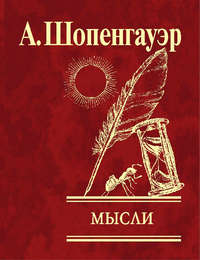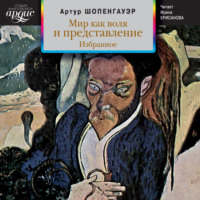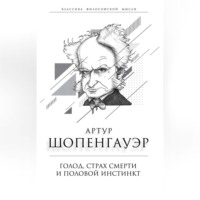 полная версия
полная версияThe World as Will and Idea (Vol. 2 of 3)
The relation of the will to the intellect here explained may also be further recognised in the fact that the intellect is originally entirely a stranger to the purposes of the will. It supplies the motives to the will, but it only learns afterwards, completely a posteriori, how they have affected it, as one who makes a chemical experiment applies the reagents and awaits the result. Indeed the intellect remains so completely excluded from the real decisions and secret purposes of its own will that sometimes it can only learn them like those of a stranger, by spying upon them and surprising them, and must catch the will in the act of expressing itself in order to get at its real intentions. For example, I have conceived a plan, about which, however, I have still some scruple, but the feasibleness of which, as regards its possibility, is completely uncertain, for it depends upon external and still undecided circumstances. It would therefore certainly be unnecessary to come to a decision about it at present, and so for the time I leave the matter as it is. Now in such a case I often do not know how firmly I am already attached to that plan in secret, and how much, in spite of the scruple, I wish to carry it out: that is, my intellect does not know. But now only let me receive news that it is practicable, at once there rises within me a jubilant, irresistible gladness, that passes through my whole being and takes permanent possession of it, to my own astonishment. For now my intellect learns for the first time how firmly my will had laid hold of that plan, and how thoroughly the plan suited it, while the intellect had regarded it as entirely problematical, and had with difficulty been able to overcome that scruple. Or in another case, I have entered eagerly into a contract which I believed to be very much in accordance with my wishes. But as the matter progresses the disadvantages and burdens of it are felt, and I begin to suspect that I even repent of what I so eagerly pursued; yet I rid myself of this feeling by assuring myself that even if I were not bound I would follow the same course. Now, however, the contract is unexpectedly broken by the other side, and I perceive with astonishment that this happens to my great satisfaction and relief. Often we don't know what we wish or what we fear. We may entertain a wish for years without even confessing it to ourselves, or even allowing it to come to clear consciousness; for the intellect must know nothing about it, because the good opinion which we have of ourselves might thereby suffer. But if it is fulfilled we learn from our joy, not without shame, that we have wished this. For example, the death of a near relation whose heir we are. And sometimes we do not know what we really fear, because we lack the courage to bring it to distinct consciousness. Indeed we are often in error as to the real motive from which we have done something or left it undone, till at last perhaps an accident discovers to us the secret, and we know that what we have held to be the motive was not the true one, but another which we had not wished to confess to ourselves, because it by no means accorded with the good opinion we entertained of ourselves. For example, we refrain from doing something on purely moral grounds, as we believe, but afterwards we discover that we were only restrained by fear, for as soon as all danger is removed we do it. In particular cases this may go so far that a man does not even guess the true motive of his action, nay, does not believe himself capable of being influenced by such a motive; and yet it is the true motive of his action. We may remark in passing that in all this we have a confirmation and explanation of the rule of Larochefoucauld: “L'amour-propre est plus habile que le plus habile homme du monde;” nay, even a commentary on the Delphic γνωθι σαυτον and its difficulty. If now, on the contrary, as all philosophers imagine, the intellect constituted our true nature and the purposes of the will were a mere result of knowledge, then only the motive from which we imagined that we acted would be decisive of our moral worth; in analogy with the fact that the intention, not the result, is in this respect decisive. But really then the distinction between imagined and true motive would be impossible. Thus all cases here set forth, to which every one who pays attention may observe analogous cases in himself, show us how the intellect is so strange to the will that it is sometimes even mystified by it: for it indeed supplies it with motives, but does not penetrate into the secret workshop of its purposes. It is indeed a confidant of the will, but a confidant that is not told everything. This is also further confirmed by the fact, which almost every one will some time have the opportunity of observing in himself, that sometimes the intellect does not thoroughly trust the will. If we have formed some great and bold purpose, which as such is yet really only a promise made by the will to the intellect, there often remains within us a slight unconfessed doubt whether we are quite in earnest about it, whether in carrying it out we will not waver or draw back, but will have sufficient firmness and persistency to fulfil it. It therefore requires the deed to convince us ourselves of the sincerity of the purpose.
All these facts prove the absolute difference of the will and the intellect, the primacy of the former and the subordinate position of the latter.
4. The intellect becomes tired; the will is never tired. After sustained work with the head we feel the tiredness of the brain, just like that of the arm after sustained bodily work. All knowing is accompanied with effort; willing, on the contrary, is our very nature, whose manifestations take place without any weariness and entirely of their own accord. Therefore, if our will is strongly excited, as in all emotions, thus in anger, fear, desire, grief, &c., and we are now called upon to know, perhaps with the view of correcting the motives of that emotion, the violence which we must do ourselves for this purpose is evidence of the transition from the original natural activity proper to ourselves to the derived, indirect, and forced activity. For the will alone is αυτοματος, and therefore ακαματος και αγηρατος ηματα παντα (lassitudinis et senii expers in sempiternum). It alone is active without being called upon, and therefore often too early and too much, and it knows no weariness. Infants who scarcely show the first weak trace of intelligence are already full of self-will: through unlimited, aimless roaring and shrieking they show the pressure of will with which they swell, while their willing has yet no object, i. e., they will without knowing what they will. What Cabanis has observed is also in point here: “Toutes ces passions, qui se succèdent d'une mannière si rapide, et se peignent avec tant de naïveté, sur le visage mobile des enfants. Tandis que les faibles muscles de leurs bras et de leurs jambes savent encore a peine former quelque mouvemens indécis, les muscles de la face expriment déjà par des mouvemens distincts presque toute la suite des affections générales propres a la nature humaine: et l'observateur attentif reconnait facilement dans ce tableau les traits caractéristiques de l'homme futur” (Rapports du Physique et Moral, vol. i. p. 123). The intellect, on the contrary, develops slowly, following the completion of the brain and the maturity of the whole organism, which are its conditions, just because it is merely a somatic function. It is because the brain attains its full size in the seventh year that from that time forward children become so remarkably intelligent, inquisitive, and reasonable. But then comes puberty; to a certain extent it affords a support to the brain, or a resounding-board, and raises the intellect at once by a large step, as it were by an octave, corresponding to the lowering of the voice by that amount. But at once the animal desires and passions that now appear resist the reasonableness that has hitherto prevailed and to which they have been added. Further evidence is given of the indefatigable nature of the will by the fault which is, more or less, peculiar to all men by nature, and is only overcome by education —precipitation. It consists in this, that the will hurries to its work before the time. This work is the purely active and executive part, which ought only to begin when the explorative and deliberative part, thus the work of knowing, has been completely and thoroughly carried out. But this time is seldom waited for. Scarcely are a few data concerning the circumstances before us, or the event that has occurred, or the opinion of others conveyed to us, superficially comprehended and hastily gathered together by knowledge, than from the depths of our being the will, always ready and never weary, comes forth unasked, and shows itself as terror, fear, hope, joy, desire, envy, grief, zeal, anger, or courage, and leads to rash words and deeds, which are generally followed by repentance when time has taught us that the hegemonicon, the intellect, has not been able to finish half its work of comprehending the circumstances, reflecting on their connection, and deciding what is prudent, because the will did not wait for it, but sprang forward long before its time with “Now it is my turn!” and at once began the active work, without the intellect being able to resist, as it is a mere slave and bondman of the will, and not, like it, αυτοματος, nor active from its own power and its own impulse; therefore it is easily pushed aside and silenced by a nod of the will, while on its part it is scarcely able, with the greatest efforts, to bring the will even to a brief pause, in order to speak. This is why the people are so rare, and are found almost only among Spaniards, Turks, and perhaps Englishmen, who even under circumstances of provocation keep the head uppermost, imperturbably proceed to comprehend and investigate the state of affairs, and when others would already be beside themselves, con mucho sosiego, still ask further questions, which is something quite different from the indifference founded upon apathy and stupidity of many Germans and Dutchmen. Iffland used to give an excellent representation of this admirable quality, as Hetmann of the Cossacks, in Benjowski, when the conspirators have enticed him into their tent and hold a rifle to his head, with the warning that they will fire it if he utters a cry, Iffland blew into the mouth of the rifle to try whether it was loaded. Of ten things that annoy us, nine would not be able to do so if we understood them thoroughly in their causes, and therefore knew their necessity and true nature; but we would do this much oftener if we made them the object of reflection before making them the object of wrath and indignation. For what bridle and bit are to an unmanageable horse the intellect is for the will in man; by this bridle it must be controlled by means of instruction, exhortation, culture, &c., for in itself it is as wild and impetuous an impulse as the force that appears in the descending waterfall, nay, as we know, it is at bottom identical with this. In the height of anger, in intoxication, in despair, it has taken the bit between its teeth, has run away, and follows its original nature. In the Mania sine delirio it has lost bridle and bit altogether, and shows now most distinctly its original nature, and that the intellect is as different from it as the bridle from the horse. In this condition it may also be compared to a clock which, when a certain screw is taken away, runs down without stopping.
Thus this consideration also shows us the will as that which is original, and therefore metaphysical; the intellect, on the other hand, as something subordinate and physical. For as such the latter is, like everything physical, subject to vis inertiæ, consequently only active if it is set agoing by something else, the will, which rules it, manages it, rouses it to effort, in short, imparts to it the activity which does not originally reside in it. Therefore it willingly rests whenever it is permitted to do so, often declares itself lazy and disinclined to activity; through continued effort it becomes weary to the point of complete stupefaction, is exhausted, like the voltaic pile, through repeated shocks. Hence all continuous mental work demands pauses and rest, otherwise stupidity and incapacity ensue, at first of course only temporarily; but if this rest is persistently denied to the intellect it will become excessively and continuously fatigued, and the consequence is a permanent deterioration of it, which in an old man may pass into complete incapacity, into childishness, imbecility, and madness. It is not to be attributed to age in and for itself, but to long-continued tyrannical over-exertion of the intellect or brain, if this misfortune appears in the last years of life. This is the explanation of the fact that Swift became mad, Kant became childish, Walter Scott, and also Wordsworth, Southey, and many minorum gentium, became dull and incapable. Goethe remained to the end clear, strong, and active-minded, because he, who was always a man of the world and a courtier, never carried on his mental occupations with self-compulsion. The same holds good of Wieland and of Kuebel, who lived to the age of ninety-one, and also of Voltaire. Now all this proves how very subordinate and physical and what a mere tool the intellect is. Just on this account it requires, during almost a third part of its lifetime, the entire suspension of its activity in sleep, i. e., the rest of the brain, of which it is the mere function, and which therefore just as truly precedes it as the stomach precedes digestion, or as a body precedes its impulsion, and with which in old age it flags and decays. The will, on the contrary, as the thing in itself, is never lazy, is absolutely untiring, its activity is its essence, it never ceases willing, and when, during deep sleep, it is forsaken of the intellect, and therefore cannot act outwardly in accordance with motives, it is active as the vital force, cares the more uninterruptedly for the inner economy of the organism, and as vis naturæ medicatrix sets in order again the irregularities that have crept into it. For it is not, like the intellect, a function of the body; but the body is its function; therefore it is, ordine rerum, prior to the body, as its metaphysical substratum, as the in-itself of its phenomenal appearance. It shares its unwearying nature, for the time that life lasts, with the heart, that primum mobile of the organism, which has therefore become its symbol and synonym. Moreover, it does not disappear in the old man, but still continues to will what it has willed, and indeed becomes firmer, more inflexible, than it was in youth, more implacable, self-willed, and unmanageable, because the intellect has become less susceptible: therefore in old age the man can perhaps only be matched by taking advantage of the weakness of his intellect.
Moreover, the prevailing weakness and imperfection of the intellect, as it is shown in the want of judgment, narrow-mindedness, perversity, and folly of the great majority of men, would be quite inexplicable if the intellect were not subordinate, adventitious, and merely instrumental, but the immediate and original nature of the so-called soul, or in general of the inner man: as all philosophers have hitherto assumed it to be. For how could the original nature in its immediate and peculiar function so constantly err and fail? The truly original in human consciousness, the willing, always goes on with perfect success; every being wills unceasingly, capably, and decidedly. To regard the immorality in the will as an imperfection of it would be a fundamentally false point of view. For morality has rather a source which really lies above nature, and therefore its utterances are in contradiction with it. Therefore morality is in direct opposition to the natural will, which in itself is completely egoistic; indeed the pursuit of the path of morality leads to the abolition of the will. On this subject I refer to our fourth book and to my prize essay, “Ueber das Fundament der Moral.”
5. That the will is what is real and essential in man, and the intellect only subordinate, conditioned, and produced, is also to be seen in the fact that the latter can carry on its function with perfect purity and correctness only so long as the will is silent and pauses. On the other hand, the function of the intellect is disturbed by every observable excitement of the will, and its result is falsified by the intermixture of the latter; but the converse does not hold, that the intellect should in the same way be a hindrance to the will. Thus the moon cannot shine when the sun is in the heavens, but when the moon is in the heavens it does not prevent the sun from shining.
A great fright often deprives us of our senses to such an extent that we are petrified, or else do the most absurd things; for example, when fire has broken out run right into the flames. Anger makes us no longer know what we do, still less what we say. Zeal, therefore called blind, makes us incapable of weighing the arguments of others, or even of seeking out and setting in order our own. Joy makes us inconsiderate, reckless, and foolhardy, and desire acts almost in the same way. Fear prevents us from seeing and laying hold of the resources that are still present, and often lie close beside us. Therefore for overcoming sudden dangers, and also for fighting with opponents and enemies, the most essential qualifications are coolness and presence of mind. The former consists in the silence of the will so that the intellect can act; the latter in the undisturbed activity of the intellect under the pressure of events acting on the will; therefore the former is the condition of the latter, and the two are nearly related; they are seldom to be found, and always only in a limited degree. But they are of inestimable advantage, because they permit the use of the intellect just at those times when we stand most in need of it, and therefore confer decided superiority. He who is without them only knows what he should have done or said when the opportunity has passed. It is very appropriately said of him who is violently moved, i. e., whose will is so strongly excited that it destroys the purity of the function of the intellect, he is disarmed; for the correct knowledge of the circumstances and relations is our defence and weapon in the conflict with things and with men. In this sense Balthazar Gracian says: “Es la passion enemiga declarada de la cordura” (Passion is the declared enemy of prudence). If now the intellect were not something completely different from the will, but, as has been hitherto supposed, knowing and willing had the same root, and were equally original functions of an absolutely simple nature, then with the rousing and heightening of the will, in which the emotion consists, the intellect would necessarily also be heightened; but, as we have seen, it is rather hindered and depressed by this; whence the ancients called emotion animi perturbatio. The intellect is really like the reflecting surface of water, but the water itself is like the will, whose disturbance therefore at once destroys the clearness of that mirror and the distinctness of its images. The organism is the will itself, is embodied will, i. e., will objectively perceived in the brain. Therefore many of its functions, such as respiration, circulation, secretion of bile, and muscular power, are heightened and accelerated by the pleasurable, and in general the healthy, emotions. The intellect, on the other hand, is the mere function of the brain, which is only nourished and supported by the organism as a parasite. Therefore every perturbation of the will, and with it of the organism, must disturb and paralyse the function of the brain, which exists for itself and for no other wants than its own, which are simply rest and nourishment.
But this disturbing influence of the activity of the will upon the intellect can be shown, not only in the perturbations brought about by emotions, but also in many other, more gradual, and therefore more lasting falsifications of thought by our inclinations. Hope makes us regard what we wish, and fear what we are apprehensive of, as probable and near, and both exaggerate their object. Plato (according to Ælian, V.H., 13, 28) very beautifully called hope the dream of the waking. Its nature lies in this, that the will, when its servant the intellect is not able to produce what it wishes, obliges it at least to picture it before it, in general to undertake the roll of comforter, to appease its lord with fables, as a nurse a child, and so to dress these out that they gain an appearance of likelihood. Now in this the intellect must do violence to its own nature, which aims at the truth, for it compels it, contrary to its own laws, to regard as true things which are neither true nor probable, and often scarcely possible, only in order to appease, quiet, and send to sleep for a while the restless and unmanageable will. Here we see clearly who is master and who is servant. Many may well have observed that if a matter which is of importance to them may turn out in several different ways, and they have brought all of these into one disjunctive judgment which in their opinion is complete, the actual result is yet quite another, and one wholly unexpected by them: but perhaps they will not have considered this, that this result was then almost always the one which was unfavourable to them. The explanation of this is, that while their intellect intended to survey the possibilities completely, the worst of all remained quite invisible to it; because the will, as it were, covered it with its hand, that is, it so mastered the intellect that it was quite incapable of glancing at the worst case of all, although, since it actually came to pass, this was also the most probable case. Yet in very melancholy dispositions, or in those that have become prudent through experience like this, the process is reversed, for here apprehension plays the part which was formerly played by hope. The first appearance of danger throws them into groundless anxiety. If the intellect begins to investigate the matter it is rejected as incompetent, nay, as a deceitful sophist, because the heart is to be believed, whose fears are now actually allowed to pass for arguments as to the reality and greatness of the danger. So then the intellect dare make no search for good reasons on the other side, which, if left to itself, it would soon recognise, but is obliged at once to picture to them the most unfortunate issue, even if it itself can scarcely think this issue possible:
“Such as we know is false, yet dread in sooth,
Because the worst is ever nearest truth.”
– Byron (Lara, c. 1).Love and hate falsify our judgment entirely. In our enemies we see nothing but faults – in our loved ones nothing but excellences, and even their faults appear to us amiable. Our interest, of whatever kind it may be, exercises a like secret power over our judgment; what is in conformity with it at once seems to us fair, just, and reasonable; what runs contrary to it presents itself to us, in perfect seriousness, as unjust and outrageous, or injudicious and absurd. Hence so many prejudices of position, profession, nationality, sect, and religion. A conceived hypothesis gives us lynx-eyes for all that confirms it, and makes us blind to all that contradicts it. What is opposed to our party, our plan, our wish, our hope, we often cannot comprehend and grasp at all, while it is clear to every one else; but what is favourable to these, on the other hand, strikes our eye from afar. What the heart opposes the head will not admit. We firmly retain many errors all through life, and take care never to examine their ground, merely from a fear, of which we ourselves are conscious, that we might make the discovery that we had so long believed and so often asserted what is false. Thus then is the intellect daily befooled and corrupted by the impositions of inclination. This has been very beautifully expressed by Bacon of Verulam in the words: Intellectus luminis sicci non est; sed recipit infusionem a voluntate et affectibus: id quod generat ad quod vult scientias: quod enim mavult homo, id potius credit. Innumeris modis, iisque interdum imperceptibilibus, affectus intellectum imbuit et inficit (Org. Nov., i. 14). Clearly it is also this that opposes all new fundamental opinions in the sciences and all refutations of sanctioned errors, for one will not easily see the truth of that which convicts one of incredible want of thought. It is explicable, on this ground alone, that the truths of Goethe's doctrine of colours, which are so clear and simple, are still denied by the physicists; and thus Goethe himself has had to learn what a much harder position one has if one promises men instruction than if one promises them amusement. Hence it is much more fortunate to be born a poet than a philosopher. But the more obstinately an error was held by the other side, the more shameful does the conviction afterwards become. In the case of an overthrown system, as in the case of a conquered army, the most prudent is he who first runs away from it.









